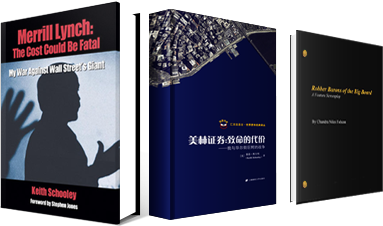ENID, Okla., October 21, 2008
Keith Schooley, a former star financial consultant with Merrill Lynch, warns Bank of America CEO Kenneth Lewis that he may soon experience buyer’s remorse over his acquisition of Wall Street’s fallen idol.
“I spoke out publicly last November in response to Merrill Lynch’s involvement in the nation’s sub-prime mortgage crisis and predicted, when no others did, that the firm was on the verge of almost certain collapse,” says Schooley, whose pioneering 2002 book Merrill Lynch: The Cost Could Be Fatal – My War Against Wall Street’s Giant is nearing completion of translation for the Asian market, where Wall Street bailouts have become commonplace in recent years.
As the list of failed US banks continues to grow, Schooley wonders why Bank of America would risk weakening its position in the fragile industry by merging with a company with a history of improper and unethical behavior.
“It did not take long for me to learn that profits and power trumped ethics and morality at Merrill,” says Schooley. “The ultimate impact on clients and shareholders seemed to be largely irrelevant. Sadly, this attitude at Merrill Lynch has proven to be extraordinarily costly to so many doing business with the firm and, ironically, now to the firm itself.”
The BofA deal is not expected to become finalized until sometime during the first quarter of 2009 and Schooley, who first exposed corruption and unethical practices at Merrill during the 1990s, believes there is still time for Lewis to withdraw the offer.
“Merrill Lynch’s rescue from certain collapse may be good news for the troubled firm, but I think it’s a red flag for shareholders and employees of Bank of America,” says Schooley.
This delay in the merger, which must also be approved by regulators and shareholders before any deal can be sealed, may provide enough wiggle room for Lewis to back out and save his company from integration into Merrill Lynch’s tainted culture.
Furthermore, with the Federal bank bailout just completed, BofA may want to instead concentrate on keeping its own good name intact.
“Merrill Lynch has sullied its reputation as a result of numerous scandals—despite second and third chances it was given to clean up its act,” warns Schooley. “I wouldn’t advise BofA to give Merrill a fourth chance at its own expense. The firm’s corrupt culture was tolerated by its senior management and board and making it a part of Bank of America may eventually sink what will soon be, at least temporarily, the ‘leading financial institution in the world.'”
